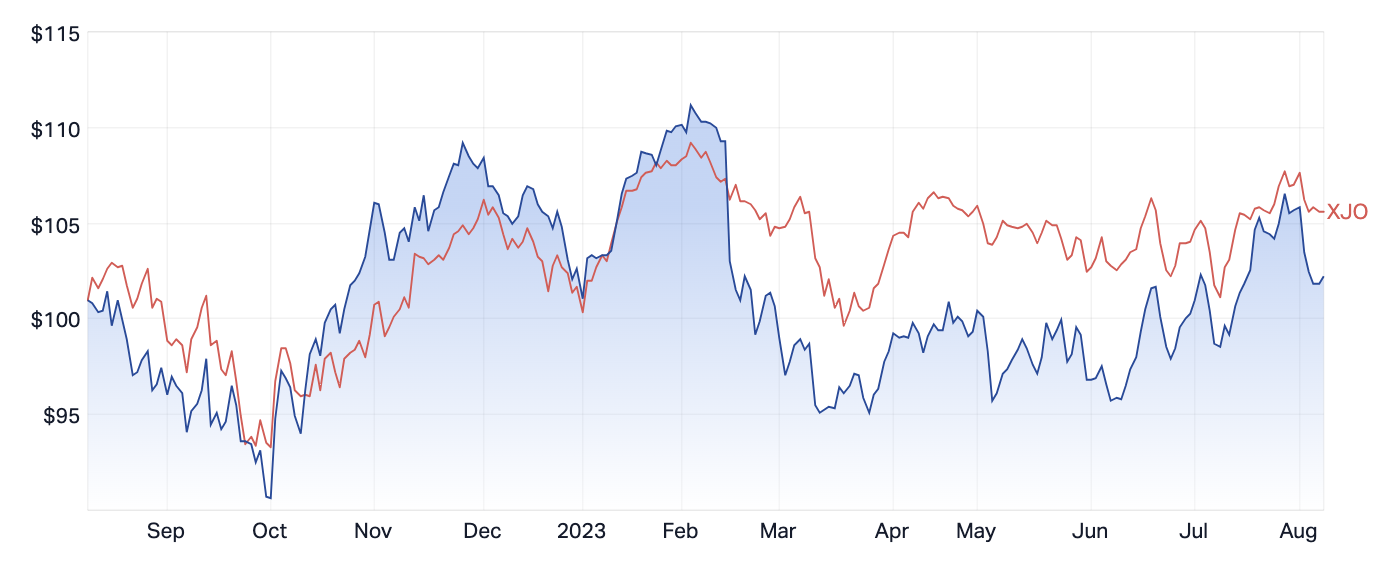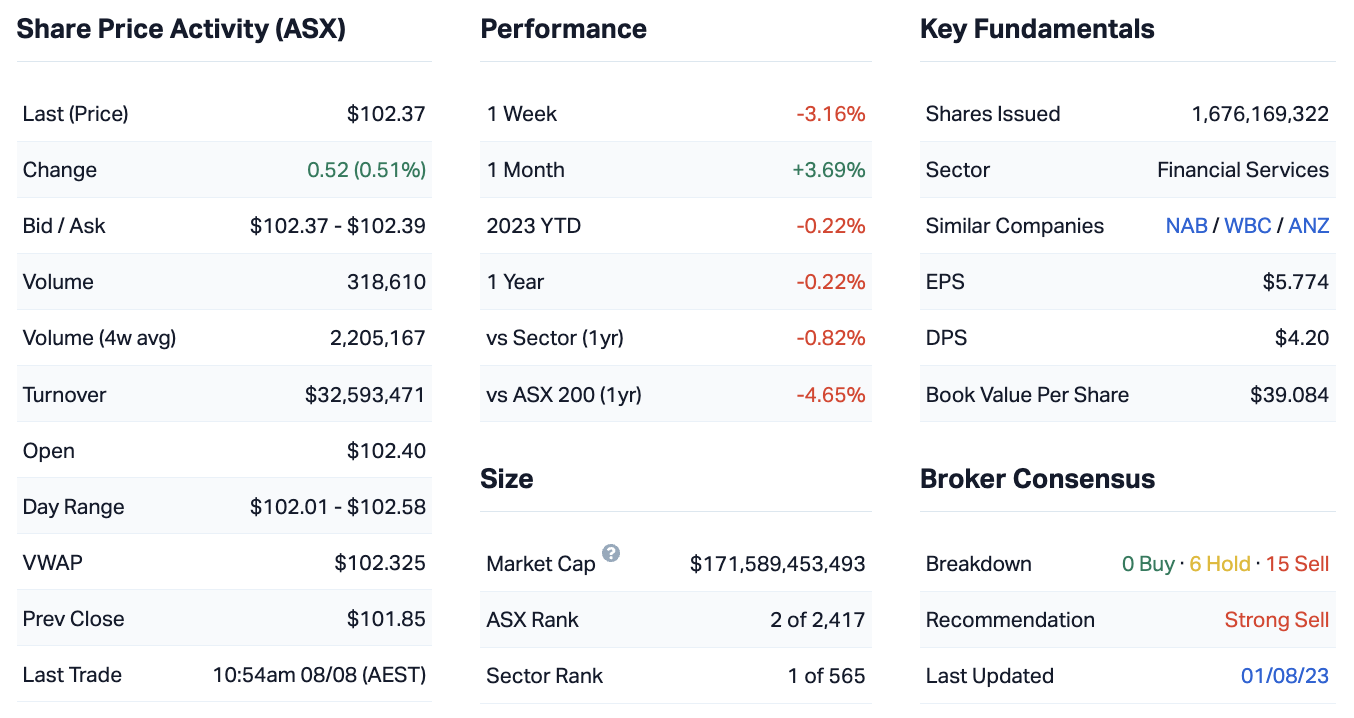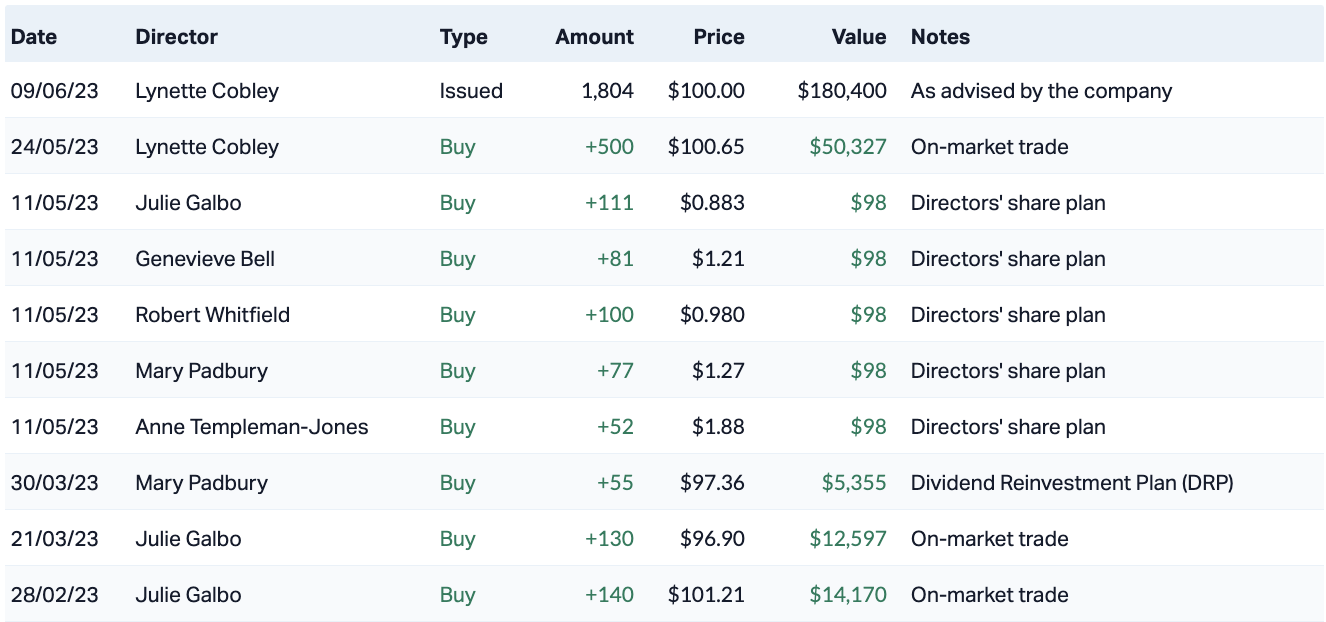Is this Commonwealth Bank's "peak earnings" moment?
At the outset of the Reserve Bank's rate hiking cycle, one group of stocks were touted to be big winners. The Big Four banks have struggled for years with interest rates at near-zero levels, increased competition from fintechs, and a balance sheet that is literally at the mercy of the housing cycle. Nowhere is this more obvious (and for that matter, important) than the Commonwealth Bank (ASX: CBA).
For months now, the big question has been whether the Banks can finally capitalise on an historic rate hiking cycle. And if they have been able to capitalise on all these rate hikes, is this the bank's "peak earnings" moment?
Today's announcement of an increased full-year dividend, increasing earnings per share, and a new $1 billion buyback may suggest that's not the case.
To discuss the CBA result and where the bank goes from here, Nathan Parkin, Investment Director and Co-Founder of Ethical Partners joined me to discuss. CBA is an overweight position in the flagship Australian Share Fund while ANZ, Macquarie Group, and Westpac are all key underweight positions in the fund.
Commonwealth Bank Chart

Note: This interview was conducted on Wednesday 9 August 2023.
Commonwealth Bank Full Year Key Results
- FY cash profits +6% to $10.16 billion vs FactSet estimate of $10.16 billion
- FY EPS of $6.02/share vs FactSet estimate of $5.89/share
- Final dividend +30 cents to $2.40/share, full-year payout of $4.50/share
- Net interest income +18% to $23 billion
- Net interest margin of 2.07%, return on equity of 14%
- Plans $1 billion buyback on top of completed $3 billion buyback
Key Company Data


In one sentence, what was the key takeaway from this result?
It was a clean result and there are better margins and outlook based on less intense competition in the mortgage market over the period.
What was the market’s reaction to this result? In your view, was it an overreaction, an under-reaction or appropriate?
Rating: Appropriate
I think it's an appropriate reaction to the result. We see that the dividend beat consensus and the net profit was slightly ahead of where the market was at. But what was really interesting was the net interest margin commentary that they gave for the fourth quarter particularly.
The market had rightly identified the mortgage competition in particular, as a feature of the first-half result and extrapolated that into FY24/25. But what we've seen today is that the mortgage competition is still there but it's just a less intense environment.
As you get these big fixed-to-variable home loan lumps come out over the next six months and probably peak around now, it is going to be accretive to margins over the medium term as that changeover happens.
But the market got very focused around the current period of the competition but as we see that becoming less intense, it's actually helpful for margins.
Do you believe that this is the peak for CBA's earnings this cycle?
Our view is that they can continue to grow profits modestly from here. The market had lower profits going forward so you're going to see some adjustment upwards in terms of the forward forecast that will exist after people digest this result.
In a broad cycle sense, the bank's probably earning peak margins but are peak profits going to fall away as quickly as what people thought? Well no. It's going to persist a bit longer.
Were there any major surprises in this result that you think investors should be aware of?
Something that's crept up over the past five years is the diversification within the Commonwealth Bank business overall. Business banking used to be about 18% of net profit. Today, it's about 34% of group profits and so that's increased materially. 34% in business versus retail at 44%. It's now a sizeable part of the business.
You don't get much commentary around the business banking part of portfolio. In this result, business banking was up 32% year on year versus retail which was relatively flat. It is a more diversified business than it was five years ago and we think that's positive for valuation going forward and it is likely to be a positive force on profit growth going forward.
I think the market probably doesn't appreciate the extent that the profit has actually diversified over the past five years. So I think that's interesting. I think the capital management part of the result signifies that the board is quite comfortable with provisions are at given another billion-dollar buyback.
The hallmark of Commonwealth Bank over the past 20 years has been their ability to manage the share count of the company in a very disciplined manner over the long term. And that's what's led to sustained outperformance of the bank versus peers over a long period of time.
We think that the continuation of a disciplined approach to capital signifies some confidence but also continues that disciplined approach that they've had. That whole fixed-to-variable mortgage changeover that is occurring is likely to be accretive to margins in the medium term.
I think that the market got a bit too focused on the intense competition that was occurring six months ago and it hadn't really factored in that it might be in a better position today.
Would you buy, hold or sell Commonwealth Bank on the back of these results?
Rating: BUY
We'd still say it was a buy here today and we do think that result was clean. The market has already got a forecast increase in bad debts over the next two years to be meaningfully higher than today. The reality might be that customers are again more resilient than what the markets are assuming today.
The one thing that we are looking at, with respect to risks, is the unemployment rate. So that's obviously very robust at this point in time. You have had wage increases coming through and Commonwealth Bank said that they've paid out an extra $10 billion in interest on deposits to customers over the last 12 months. That's obviously making parts of the economy quite resilient.
We can see that the economy is holding up better than forecasts would have had it from a year ago and there's good reasons for that. But we are watching the unemployment rate because that's the key bellwether indicator that we look at for the banking sector in general, to work out if things are getting tougher, and the people's ability to actually make payments on their biggest debts.
That's one thing we're watching and if that changed, we would be more cautious. But at this stage, it appears that in general terms while some areas of the economy are suffering from higher rates, it's holding up better than forecast.
What’s your outlook on the banking sector? Are there any risks to this company and its sector that investors should be aware of?
I think the main risk is just having a disciplined approach to managing through what is actually a difficult period to forecast. A year ago, we thought NAB (ASX: NAB) was too expensive. Today, we think it's relatively good value so we've been adding to that position.
We're underweight Westpac (ASX: WBC) and ANZ (ASX: ANZ) on the other side of it. And those are really bank-specific issues there. I mean Westpac's still had some execution issues, with respect to market share. The margins are holding up okay but we need to see those volumes come back. ANZ's obviously reasonably distracted with respect to the Suncorp bank takeover and the ACCC turning that down the other day. I mean they raised money at roughly $18/share to fund that acquisition and now the market's talking about buybacks at $25. We don't think that's good economics.
So we're a bit cautious around that, not that they've done it yet, but if they were to, that would be a negative in our view.
The indicators that we're looking at broadly across the sector is continued growth seems to be occurring still. CommBank grew their book in the year but at what margin they can do that and who's losing market share as that occurs is another one.
And then, the development of bad debts. You can see some signs but not many, that things are getting slightly tougher, but it really hasn't developed in it in a big way as yet.
From 1-5, where 1 is cheap and 5 is expensive, how much value are you seeing on the ASX right now? Are you excited or are you cautious about the market in general?
Rating: 4/5
On the broader market, we would say that valuations or the attractiveness of the market is a four. The reason for that is some of the lower growth types companies like Telstra (ASX: TLS), Brambles (ASX: BXB) and the like are probably priced to protection. The market, in this uncertain economic time, has gravitated towards some of these defensive-type businesses and paid a very high price for [them].
We would say a lot of those larger-cap businesses, including things like Suncorp (ASX: SUN), had a slightly worse result than what people thought. We think that's a crowded long trade that's also expensive.
We think that's gonna be a common theme through reporting season that these expensive defensives that are well-owned and maybe don't report as well as expected or even in-line gets a negative share price reaction. So, for that reason, we're thinking that sectors like telcos and general insurance are well-priced and it's going to see the market remain pretty expensive across the board.
As for other areas that we are finding interesting, there's selective value emerging in things like REITs where you can get a decent yield. And if the yield curve is right and we're nearing the peak of rates in this cycle, I think that looks interesting.
Also, healthcare, which has been probably oversold and can benefit from that trend as well but also recover earnings from a cyclical low point. Those companies are still recovering from a low incidence of healthcare treatment post-COVID. Consumers are spending things on what they want to do rather than what they need to do but we do think that there's a trend in the next three years of people pulling back from things like travel and actually doing in their knee replacement that they've been putting off.
So we do think that trajectory of earnings might change for some sectors and healthcare is one that we see as being sold down and it's usually a market darling but today, it's really not. So we're looking for opportunities in that part of the market too.
10 most recent director transactions


Catch all of our August 2023 Reporting Season coverage
The Livewire Team is working with our contributors to provide coverage of a selection of stocks this reporting season. You can access all of our reporting season content by clicking here.
3 topics
7 stocks mentioned
1 fund mentioned
1 contributor mentioned


